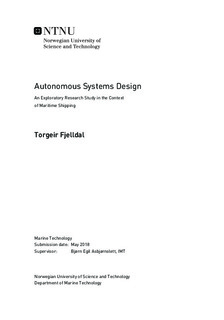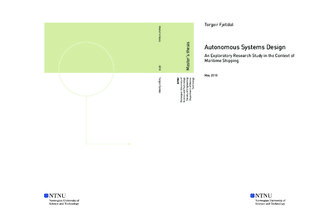| dc.description.abstract | The maritime shipping industry is experiencing a rapid development towards utilizing autonomous systems to a greater extent. These systems are capable of decision-making and executing actions on behalf of or in cooperation with humans, rendering conventional shipping operations to be performed by unmanned vessels possible. The disruptive effects of autonomy will challenge conventional methods for designing and operating ships. Most marine systems can be fundamentally redefined, opening up possibilities for new ideas and innovation.
The objective of the master's thesis was to investigate how autonomy will affect the existing systems on board a conventional container ship as it is expected that many functions previously carried out on the vessel itself can be performed at remote locations or be proven redundant. This was the foundation for the first research question: Which physical system changes will result from including autonomous capabilities in ship design of a conventional container vessel? Due to the novelty and disruptiveness of autonomy it is important to explore how existing approaches can be adapted to assess the uncertainty and complexity associated with including autonomy in the design of future marine systems. This leads to the second research question: Which methodologies exist that can provide decision support for autonomous systems design?
To answer the research questions, an exploratory research study was carried out by reviewing available literature on autonomous visions and projects to identify trends in the systems architecture needed for achieving autonomous capabilities as well as highlighting design challenges and potential barriers from different relevant aspects. This became the foundation for the case study where a selection of applicable design methodologies were used to gain insights in the relationships and interactions between the various on-board systems of a container ship and a proposal for a functional breakdown and changes to the on-board systems for an autonomous container ship was developed. Further, a demonstration of the autonomous job analysis method was applied to investigate if it could uncover additional design challenges and functional requirements related to autonomous operations.
Due to limitations in available information and the early phase of development in autonomous systems design within the maritime shipping industry, reaching a quantitative conclusion to the research questions was not an objective for this exploratory research study. The thesis concluded on the first research question that determining which physical systems on board the vessel are going to change was not achievable at this stage of development. This is because of the disruptive effects and uncertainties related to autonomy as well as the immense amounts of possibilities in the systems design. However, generic ways of how the mapping between functional requirements and design parameters was identified, which is valuable to understand from a systems design point of view as it gives insights into how the physical systems is affected by autonomy.
Finally, the autonomous job analysis was proven as an efficient method to provide decision support for uncovering additional functional requirements for the autonomous capabilities needed for different parts of the voyage. Thus answering the second research question. For further work it would be desirable to perform a more comprehensive analysis on the presented case study. However, that would require a multitude of expertise from disciplines such as marine systems design, information and communications technology (ICT) architecture and cybernetics. The author believes that the combination of different areas of competencies is a key factor for achieving a more holistic autonomous systems design. | |

